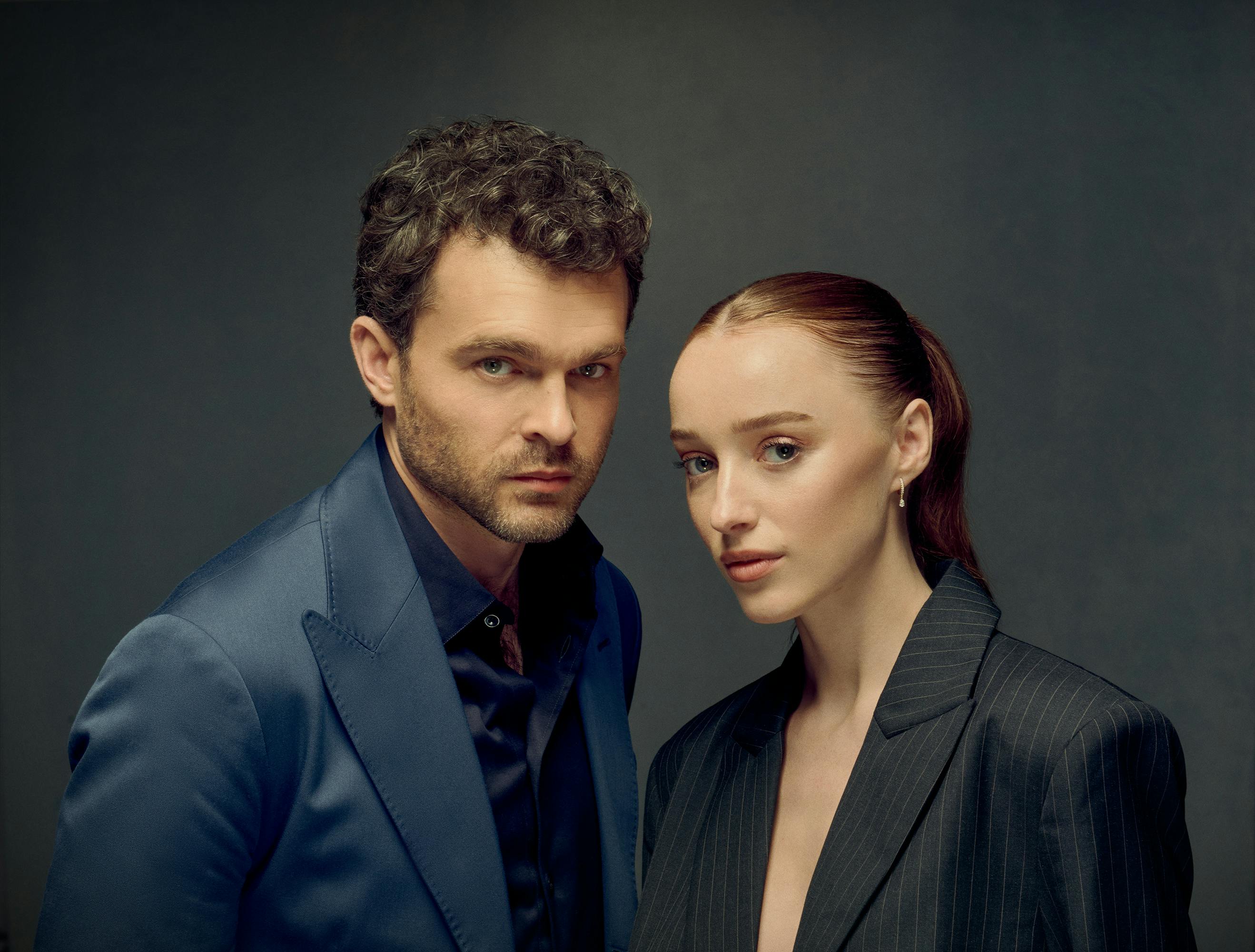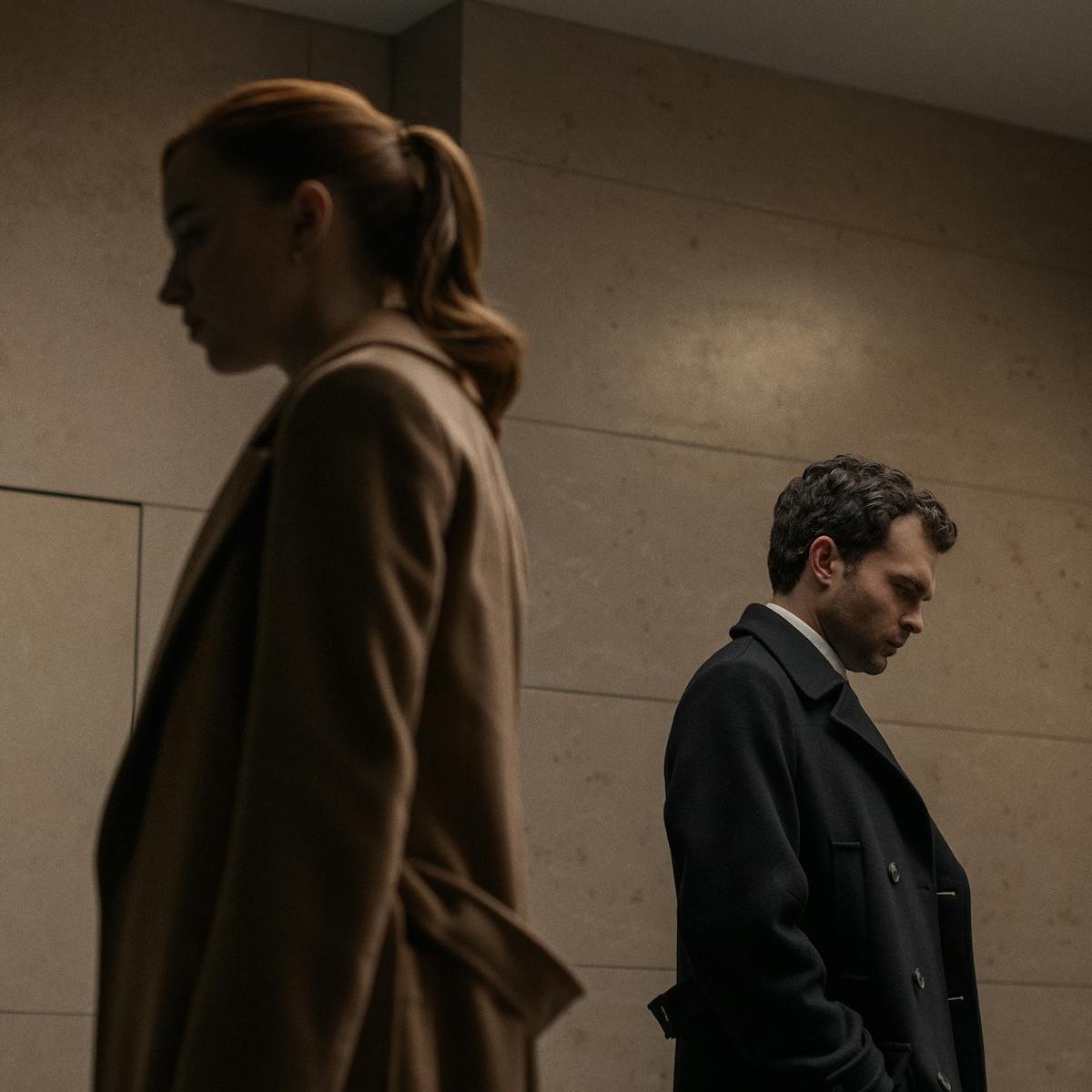Alden Ehrenreich and Phoebe Dynevor are both actors who have found meaning in the past.
Whether it’s his romp through Hollywood’s Golden Age as singing cowboy Hobie Doyle in Joel and Ethan Coen’s Hail, Caesar! or her sizzling and subversive portrayal of Regency romance as Daphne in the Shondaland series Bridgerton, their work has explored history to shed new light on the present. But as the leads in relationship thriller Fair Play, the pair take on a new challenge, tackling a complex story about power and gender dynamics that could not be more current. “I’ve never done a job that took place in the world that I actually live in,” says Ehrenreich. “I don’t think I’ve ever looked at a phone [onscreen] in my whole career.”
Helmed by writer-director Chloe Domont in her feature directorial debut, the film stars Ehrenreich and Dynevor as newly engaged couple Luke and Emily, whose jobs as financial analysts at the cutthroat hedge fund One Crest Capital require them to keep their relationship a secret. A sudden opening in the upper echelons initially gives them cause for celebration; office rumor has it that Luke’s career is about to take off. Instead, Emily is called in by their boss (Eddie Marsan) and given the good news: She’s the one taking over. As love and partnership are confronted by ambition and established expectations, the couple spirals into a toxic whirlwind that threatens their romantic future, their careers, and their very perceptions of who they are.

Phoebe Dynevor
Ehrenreich and Dynevor’s searing chemistry drives the film, which demands performers who can quickly pivot from romantic comedy banter to serious jargon about capital markets, and turn intimate moments into visions of pure rage. “When I met with Alden and Phoebe for the roles, it was pretty instantly [clear] that they were perfect for these characters,” says Domont. “They’re two incredibly strong, versatile actors that can do anything. [But] also what excited me about it was that they had never done anything like this before. I love to cast against type.”
“I’ve been waiting for a movie like this for a long time,” says Dynevor, who trades in the barbed courtesies of the aristocratic marriage market for another male-dominated world: high-stakes finance. Still, there is nothing of the mild-mannered debutante in Emily. Dynevor plays her as a woman confident in her sexuality and ambition, qualities Luke admires until they start to pose a threat. In the aftermath of Emily’s promotion, Luke’s simmering insecurities boil over in increasingly violent ways, revealing an ugly underbelly of resentment and entitlement beneath his thin veneer of supportive feminism. Like so many women, Emily finds herself in a dizzying high-wire act, trying to balance minimizing her own professional successes at home, while trying to prove herself at work. “This film really explores how women can feel very crippled and isolated by their success and how they have to ultimately suppress a lot of their strengths to avoid the rage of a really insecure man,” says Dynevor.
To tap into the character’s psyche, Dynevor embraced the power suit. “Emily’s look was very important to getting in her headspace,” she says. “She’s surrounded by men in suits, and she’s wearing these stiletto heels. That’s the only way she feels confident.” As her positions within her company and her relationship shift, so does her attire — especially after a disgruntled Luke comments that her silk blouses and skirts make her look “like a cupcake.” The next morning, Emily chooses a black turtleneck. “Luke slowly picking at what she’s wearing is very unsettling
to her,” Dynevor explains. “She starts in skirts and by the end of the film, she’s mostly wearing suits and trouser pants.”

Alden Ehrenreich
Ehrenreich, who as a young Han Solo in Solo: A Star Wars Story swaggered in the shoes of one of Hollywood’s most iconic men, was especially interested in Fair Play’s nuanced exploration of masculinity. Far from presenting Luke as a one-dimensional monster, the movie unpacks layers of deeply rooted, internalized expectations of male behavior that turn would-be good guys toward bad behavior. “I was a big fan of Glengarry Glen Ross — the movie and the play — growing up,” he says. “There’s a kind of cutthroat, very masculine energy in that that was really captivating to me as a teenager. When you get older and [start] exploring issues like this, you realize that from the outside it seemed exciting, but the people within those stories were just lost and miserable, and are not men to aspire to be. This movie is dealing more directly with the consequences and the pain of that for everyone.”
Even as their relationship onscreen turned venomous, Ehrenreich and Dynevor leaned on each other for support offscreen. “I always say chemistry with another actor is unexplainable,” says Dynevor. “Working with Alden was amazing. He’s a wonderful actor and we really were able to create this safe space together.” Adds Ehrenreich: “We immediately hit it off. It was really clear what a passionate artist she is, how much she cared about this story, how much she cared about this character. [She’s a] really genuine, truthful, present actor.”
Before the cameras rolled, Domont set up extensive rehearsals and encouraged Ehrenreich and Dynevor to work together to construct a backstory for their characters that could solidly anchor their performances. “We did an improvisation of the first time [our characters] met,” says Ehrenreich. “It was her first day at the office, and I walked her around and gave her a tour, and we were flirting, and all that kind of stuff. We did an improvisation [of] the first time we ever told each other we loved each other and kind of opened up and got vulnerable. So, we’re building these memories, we’re building this history together, and we’re also, as people, getting comfortable with each other and knowing that we can fail in front of each other and that we have each other’s back.”

When I met with Alden and Phoebe for the roles, it was pretty instantly [clear] that they were perfect for these characters.
Chloe Domont
The trust built between the actors during those early moments was crucial when the time came to film one of Fair Play’s most disturbing and intense scenes. Ehrenreich and Dynevor worked with intimacy coordinator Samantha Murray to capture a confrontation between the couple that gets out of hand. “It helps so much because you both know where the line is,” says Ehrenreich. “We do certain exercises [to get] comfortable with each other [and] check in on each other. Then, doing those scenes, you just have to keep communicating; but the basis of mutual respect and the feeling of being on the same team really made those a lot easier than they would’ve been otherwise.”
Domont’s creative vision acted as Dynevor’s North Star, guiding her through emotionally and physically grueling sequences. “There’s a reason for every single aspect of those scenes,” she says. “We crafted them very carefully to really make us all feel safe so we could explore them to the fullest.”
Heart-pumping onscreen tension aside, both actors agree that working with Domont was its own special thrill. The director encouraged them to tap into exhilarating new levels of performance and take risks that felt empowering and transformative. “I could go on and on about working with Chloe,” says Dynevor. “It felt very easy coming onto set and knowing that you were in safe hands because she would always push us to the brink. By the end, you’re absolutely exhausted but you’ve given everything you can give.” Says Ehrenreich: “She let me go off the rails in a way that I haven’t really gotten to. There’s no greater fun than to have 150 people on set and things [are] rolling and [you] get to do something completely ridiculous or absurd.”
All content featured in this piece was captured in accordance with guild guidelines.




